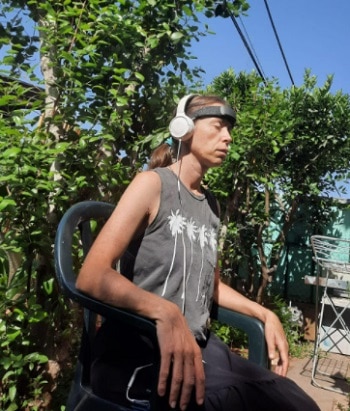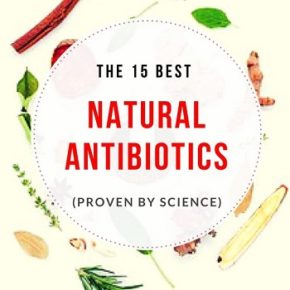Any time we feel stressed, our body releases two stress hormones – cortisol and adrenaline, which prepare our body for an emergency.
But when we are chronically stressed, this constant release of hormones can cause symptoms such as tense muscles, digestive problems, irritability, sleep problems, and more.
To recover from this, and to re-balance the adrenal system, the body needs stress-relieving foods and herbs.
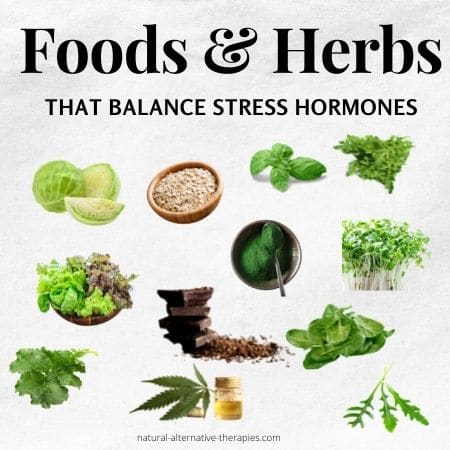
(This post may contain affiliate links, at no extra cost to you.)
In this post, you’ll find the most beneficial foods to eat during stress, according to ancient Chinese medicine.
Page Contents
What Happens to Your Body When You Are Stressed?
We’ve all heard about the adrenal gland. The gland, which is actually a pair of glands, is located on the top of each kidney below the diaphragm and is responsible for the states of stress and balance in the body.
Did we suddenly hear an alarm? The adrenal gland goes into action!
It is instructed by the brain to secrete stress hormones: cortisol and adrenaline, which quickly prepare our bodies for the new state of emergency (real emergency, like a bear attack, not running out of coffee).
This process of energetic alertness requires a chain of reactions, which begins with the breakdown of fats, proteins and blood sugar, and continues with heart pulse acceleration, an increase in blood pressure, the secretion of minerals from the bones, and more.
As a result, our body becomes fully alert, the ability to think improves, the lungs get more oxygen, the appetite goes down and the digestive system lowers its activity.
How Does Your Body Return to Balance?
Returning to balance also requires high cortisol levels (temporarily).
From the point of view of energetic Chinese medicine, in times of mental stress and strain, the liver is heavily affected, due to blockage of energy that has accumulated and is not flowing properly in the body.
This energy blocking in the liver may cause the appearance of symptoms such as muscle tension in the neck, shoulders and upper back area, nervousness and mood swings, various digestive problems, headaches, and more.
How Can Food Help Relieve Stress?
Levels of cortisol can sometimes remain high even after the resolution of a stressful situation, which can have a series impact on your health, including weight gain and adrenal fatigue.
As the tension continues, we enter a stage where the body itself tries to repair the damage caused by stress, using substances that come from our diet. We can help it out by giving it certain foods and herbs.
The body’s resilience depends a lot on the adrenal glands’ ability to secrete stress hormones as well as the body’s ability to flow the liver energy (Metabolism of cortisol takes place mainly in the liver).
For this purpose, the body needs a diet rich in proteins, pantothenic acid, and vitamins E, B, and C.
Foods and Herbs That Reduce Stress Hormones
Here are some recommended foods during stressful times:
1. Green vegetables – lettuce, baby leaves, radish leaves, rocket, arugula, broccoli, spinach, cabbage, sprouts, basil, fresh or dried wheat germ.
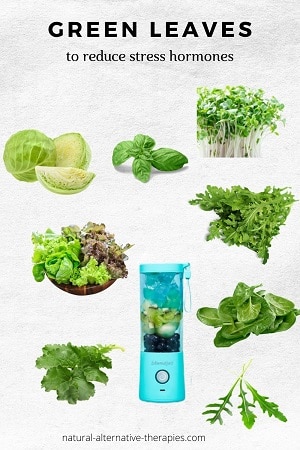
I just do a daily shake of greens with 1 banana to sweeten up this stress-relieving smoothie, I carry it around with me in my Blendjet and make a fresh shake whenever I want to.
2. Algae such as chlorella and spirulina (that contain protein, essential amino acids, minerals, B vitamins, omega-3, chlorophyll, and more).
They are very nourishing, strengthening and renewing the hormonal, nervous and immune systems, strengthening the blood and regulating metabolism.
3. Herbal infusions – Chamomile and Melissa nourish the central nervous system and glands.
4. Green tea contains a small amount of caffeine (so avoid it in the evening) but helps treat headaches and depression, stimulates the immune system, helps the digestive system, and removes toxins from the body.
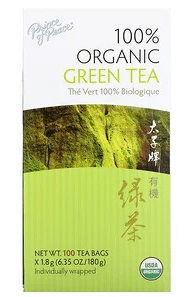
5. Animal protein should be reduced, especially red meat and dairy products. One egg per day, legumes (lentils, beans, chickpeas), and fish are recommended.
You should eat moderate portions of whole grains (rice, quinoa), and you should eat a lot of oatmeal, which calms the mind. Complex and full carbohydrates rich in dietary fiber contribute to stress relief thanks to a high amount of B vitamins that give a feeling of relaxation (study).
6. dark chocolate – Researchers found that eating the equivalent of one average-sized dark chocolate candy bar (1.4 ounces) each day for two weeks reduced levels of the stress hormone cortisol as well as the “fight-or-flight” hormones known as catecholamines in highly stressed people.
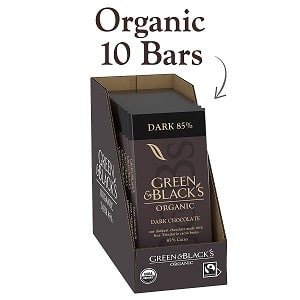
7. CBD Oil – CBD oil is well-researched and proven to relieve anxiety and stress while improving your sleep – a great way to break the vicious insomnia-stress cycle. See more ways to fight night-time anxiety – naturally.
Foods That Cause Stress and Anxiety
Surprisingly, some foods can lead to a stress reaction in the body, just like a mother-in-law’s impending visit.
Here are the 5 worst foods and beverages to avoid when you are highly stressed:
1. Sugar – When you eat sugary foods, blood sugar levels spike, and the body releases more cortisol to balance blood sugar. This may lead to sleep problems, decreased immune response, headaches, and unhealthy food cravings.
2. Processed Carbohydrates – they have no nutritional value and are actually worthless calories. And they also lead to fluctuating blood sugar levels that can cause you to feel moody and irritable.
The high sodium in most standard packaged foods can lead to a feeling of bloating and increase your blood pressure, which affects your stress levels.
3. Alcohol – while it may feel relaxing to have a glass of wine, alcohol actually increases the release of stress hormones and increases blood pressure. It can also interfere with your sleep patterns.
4. Coffee – While caffeine is proven to be a mood-booster by stimulating dopamine activity, it can also damage the absorption of major mood-balancing nutrients like vitamin D and the B vitamins. The added sugar can also cause a post-sugar crash soon after you finish your mug and more cortisol in your blood.
5. Ice cream – drowning your stress and anxiety with a pint of ice cream won’t cool off your mind. In fact, foods that are high in refined sugar only increase stress hormones, including cortisol.
That’s because your body can’t use up all that refined so your blood glucose levels plummet rapidly, which is immediately interpreted by your body as an emergency situation, leading to more secretion of stress hormones.
7 More Ways to Balance Cortisol Levels
Foods and herbs are important for coping with stress and supporting your mood, but “there’s no single food that’s going to do it all,” says integrative medicine doctor Yufang Lin, MD, who claims you have to look at the whole lifestyle picture.
1. Exercise is important for releasing accumulated stress and releasing endorphins that improve mood.
2. Acupuncture and Shiatsu treatment are very effective in releasing accumulated stress in the body and treating the energy regulation that contributes to improving glandular activity.
I have an acupressure mat that I use at home at least 3 times a week – for just 5 minutes.
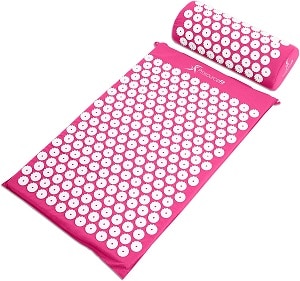
3. Sleeping well – A bad night’s sleep or more prolonged sleep deprivation can lead to increased levels of cortisol in the bloodstream.
4. Simple Relaxation Techniques – Meditation, mindfulness, and even simple breathing exercises can help you deal with stress much more effectively. I love doing breathing exercises, and they have helped me stop anxiety attacks.
I use my Muse headband Meditation device every day – see my results!
5. Taking up a hobby – Hobbies can be a rewarding and satisfying way to lead a fuller and healthier life, and they can lead to an increased sense of well-being.
For example, studies have shown that gardening and reading led to decreased levels of cortisol. It also seemed to improve the quality of life more than conventional occupational therapy.
6. Supplements – Lots of widely available dietary supplements contain nutrients that regulate steroid hormone homeostasis.
A chemical compound that affects the hormonal control of cortisol is γ-aminobutyric acid (GABA), which leads to the secretion of cortisol by the adrenal cortex. Natural sources of this substance can be fermented milk products, sprouts of brown rice, barley, and beans.
Also, research suggests the following herbs and natural supplements may lower stress, anxiety, and cortisol levels:
- Ashwagandha
- Rhodiola
- Lemon Balm
- Chamomile
How to Check Your Cortisol Levels at Home
As I mentioned, high levels of cortisol can lead to symptoms such as high blood pressure, a flushed face, muscle weakness, increased thirst, frequent urination, mood changes, irritability, weight gain in the abdomen and face, and bruises or purple stretch marks appearing on the skin, impaired brain function, and more.
You can easily check your cortisol levels at home with the EverlyWell at-home cortisol test, which measures cortisol, cortisone, melatonin, and creatinine. These hormones affect your sleep cycle and stress response.
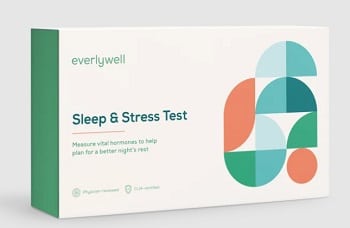
The sample is collected from the urine, and you get the results within days. The process is quick and easy.

A budget pick would be the HealthConfirm cortisol saliva test, which measures your adrenal gland hormones 4 days a day through your saliva, and then shipping the samples off to the labs. You’ll get the result within 3-5 days into your secure profile at their website.
Conclusion
A proper diet will support and help the body overcome and continue to repair the damage caused to it in times of stress and stress, and most importantly, will strengthen and help in healing the body if stress is chronic in your life.
There are many more ways to reduce stress hormones, including exercise, acupuncture, sleeping well, simple relaxation techniques, and taking up a hobby.
To your health and happiness,
Meital
Studies
Young LM, Pipingas A, White DJ, Gauci S, Scholey A. A Systematic Review and Meta-Analysis of B Vitamin Supplementation on Depressive Symptoms, Anxiety, and Stress: Effects on Healthy and ‘At-Risk’ Individuals. Nutrients. 2019;11(9):2232. Published 2019 Sep 16.
Musty, Richard. (2006). Cannabinoids and anxiety. 10.1007/3-7643-7358-X_7.
Dymkowska-Malesa M, Walczak Z (2011) Supplementation in sport. Med News 80(3):199–204
Zellner DA, Loaiza S, Gonzalez Z, Pita J, Morales J, Pecora D, Wolf A (2006) Food selection changes under stress. Physiol Behav 87:789–793
Hepsomali P, Groeger JA, Nishihira J, Scholey A. Effects of Oral Gamma-Aminobutyric Acid (GABA) Administration on Stress and Sleep in Humans: A Systematic Review. Front Neurosci. 2020;14:923. Published 2020 Sep 17.

